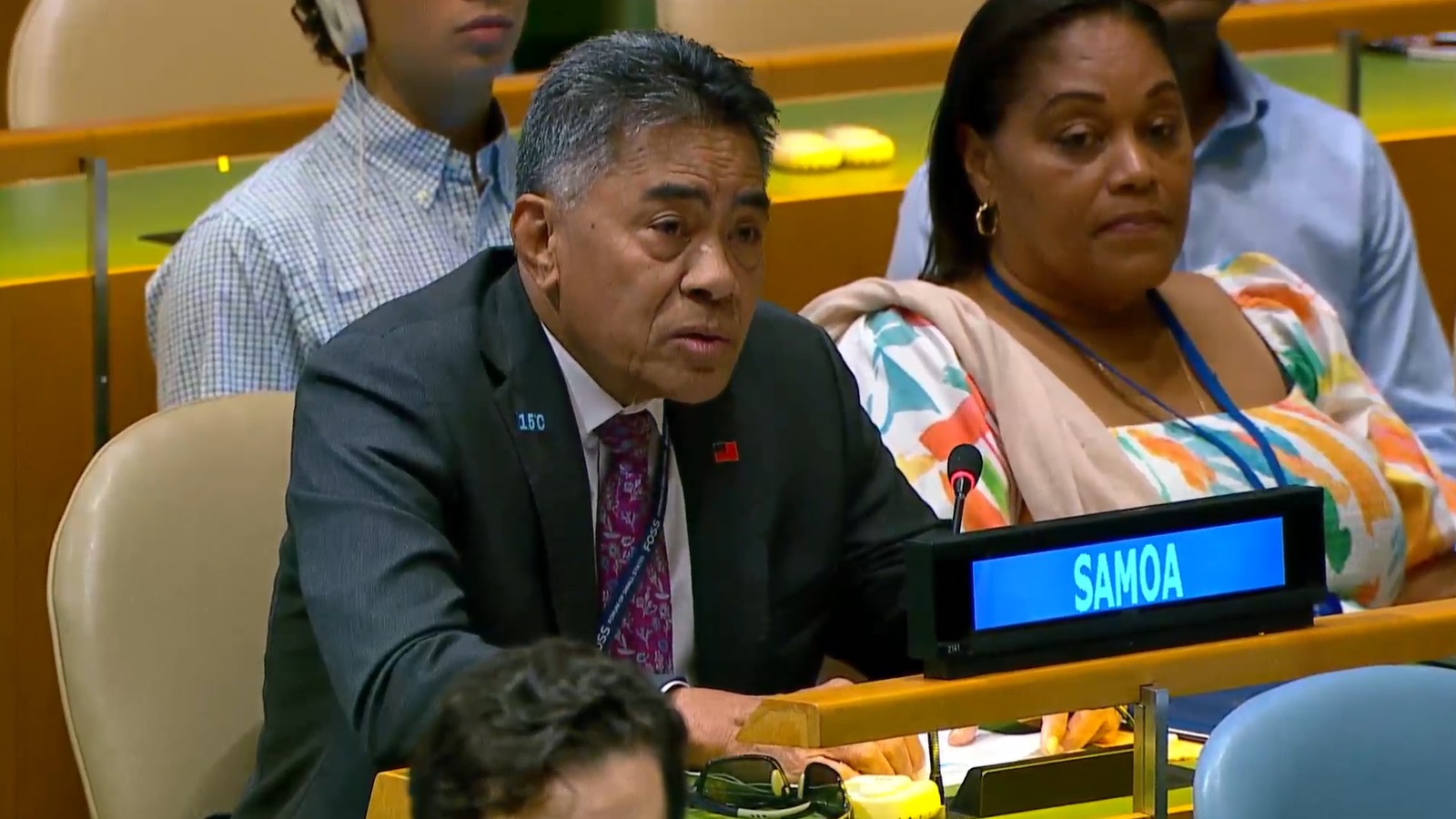STATEMENT
A Renewed Declaration for Resilient Prosperity – Adoption of General Assembly draft resolution A/78/L.80 on the Antigua and Barbuda Agenda for Small Island Developing States
July 16, 2024 AOSIS Chair, His Excellency Fatumanava Dr. Pa’olelei Luteru Download PDFTopic: Sustainable Development

Mr. President, I am pleased to speak on behalf of the Alliance of Small Island States (AOSIS). We align ourselves with the statement to be delivered by the representative of Uganda, on behalf of the Group of 77 and China. I would like to once again congratulate the Government and the people of Antigua and Barbuda on successfully hosting the Fourth International Conference on Small Island Developing States (SIDS). We also acknowledge the leadership and efforts of all those who contributed to and played an instrumental role in the convening of SIDS4, and achieving the strong outcome document of the Conference, the Antigua and Barbuda Agenda for SIDS – A Renewed Declaration for Resilient Prosperity (ABAS). As the General Assembly adopts the draft resolution endorsing the outcome of the Fourth International Conference on Small Island Developing States (A/78/L.80), the havoc caused by Hurricane Beryl across the Caribbean region a couple of weeks ago serves as a stark reminder of the grave consequences of unmitigated climate change, and of the painful and irreparable losses and developmental setbacks that SIDS continue to face in the wake of such disasters. This is a situation that must end. Despite progress in addressing our challenges, SIDS experienced significant gaps in the implementation of the Barbados Programme of Action, the Mauritius Strategy, and the SAMOA Pathway. The Antigua and Barbuda Agenda for SIDS, if fully implemented, will set the course for the transformative shift that SIDS require to achieve sustainable development. The ABAS is a concise, focused and action-oriented blueprint that requires us to move away from the business-as-usual approach, and to adopt more deliberate actions to address the needs and priorities of SIDS. However, agreeing to a programme of action is only a first step. The question now is: How do we effectively implement the Agenda for SIDS and deliver on its commitments? How do we avoid perpetuating the gaps in implementation from previous Programmes of Action? First, meeting the sustainable development priorities of SIDS requires our collective efforts. As a special case for sustainable development, we have reaffirmed our commitment to support SIDS on their pathway to achieving sustainable development and resilient prosperity. Genuine and durable partnerships once more underpin our international cooperation for supporting the implementation of our concrete goals and targets, and SIDS must be equal partners in them. They must involve our development partners, the private sector, civil society, youth, women, persons with disabilities and older persons. Effective and long-lasting capacity-building, economic development, and institution-strengthening for SIDS, rather than ad hoc responses, are critical for SIDS to take ownership of their sustainable development and build their resilience. We are past the point of tokenism; demonstrable action and investment that bring tangible results are key. For our partners, more discipline will be required to fulfil longstanding commitments that will give us the means of implementation to ensure that our goals and targets are met. While we welcome the announcements of support at the Fourth International Conference, effective implementation requires more predictable means, including financing, capacity-building, technology transfer, data collection and management, partnerships and technical cooperation. The operationalization of the SIDS Centre of Excellence as a key institution for implementation will be critical. Second, we need to track progress of implementation. The work towards a robust plan of action with an accompanying monitoring and evaluation framework will strengthen accountability at all levels, and support implementation in a coherent and responsive manner. Strengthening United Nations system-wide support will most certainly contribute to improving the delivery of commitments made, under the ABAS. AOSIS cannot stress enough that the mainstreaming of the ABAS across the United Nations will allow the organisation to be more effective as a key development partner that offers tailored support to SIDS. Lastly, the ABAS is our roadmap for the next ten years. However, it will not deliver on its objective if it is not integrated into the relevant ongoing processes appropriately, including the Summit of the Future and the Fourth International Conference on Financing for Development. Like its predecessor, the ABAS remains aligned with the 2030 Agenda for Sustainable Development and will contribute to achieving the sustainable development goals. As such, the role of the High-Level Political Forum in the follow-up and implementation of the ABAS remains of paramount importance. In this regard, we welcome last week’s discussions during the dedicated SIDS segment and look forward to using the Forum as a platform to advance implementation and international cooperation. In closing, Mr. President, we left the Fourth International Conference with a sense of hope and optimism; albeit cautious optimism. After all, SIDS have found themselves at this juncture before. SIDS will approach the next decade with renewed tenacity and hope. We have every confidence that the United Nations and our partners will provide the meaningful support on our journey towards resilient prosperity. The time for action is now. The time for full and effective implementation is now. It is AOSIS’ sincere expectation that in ten years, we will not have to discuss, in disappointment, “implementation gaps”. But rather, SIDS will be able to set our eyes on a new horizon, with our sails filled with the winds of transformation that only resilient prosperity can bring. I thank you.
Sub Topic: SDGs
____________________________